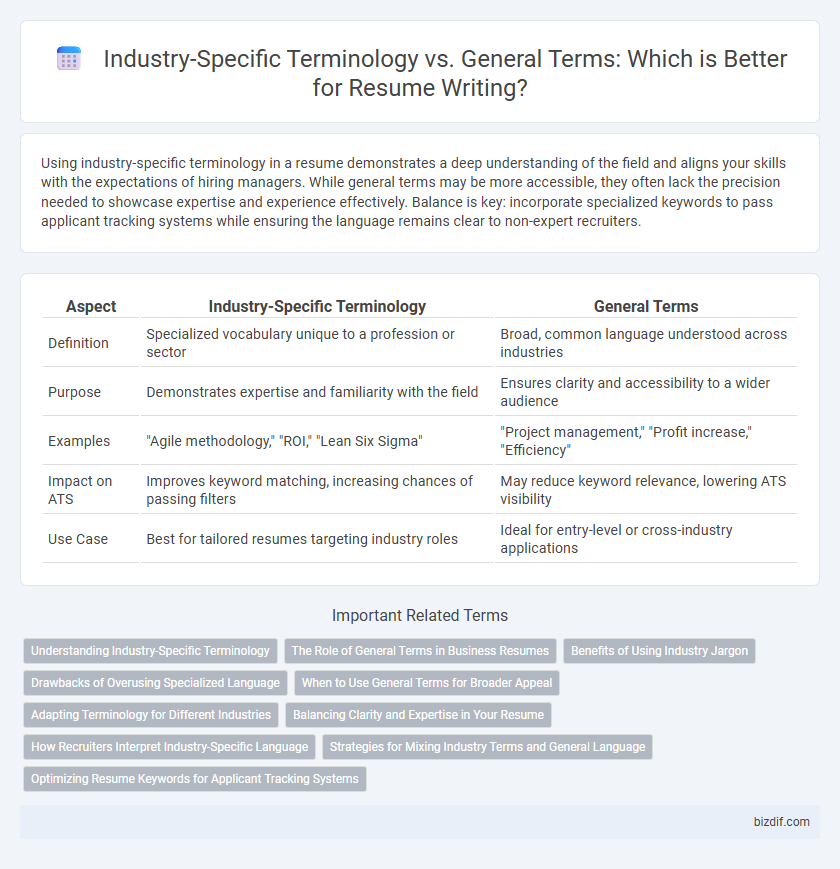Using industry-specific terminology in a resume demonstrates a deep understanding of the field and aligns your skills with the expectations of hiring managers. While general terms may be more accessible, they often lack the precision needed to showcase expertise and experience effectively. Balance is key: incorporate specialized keywords to pass applicant tracking systems while ensuring the language remains clear to non-expert recruiters.
Table of Comparison
| Aspect | Industry-Specific Terminology | General Terms |
|---|---|---|
| Definition | Specialized vocabulary unique to a profession or sector | Broad, common language understood across industries |
| Purpose | Demonstrates expertise and familiarity with the field | Ensures clarity and accessibility to a wider audience |
| Examples | "Agile methodology," "ROI," "Lean Six Sigma" | "Project management," "Profit increase," "Efficiency" |
| Impact on ATS | Improves keyword matching, increasing chances of passing filters | May reduce keyword relevance, lowering ATS visibility |
| Use Case | Best for tailored resumes targeting industry roles | Ideal for entry-level or cross-industry applications |
Understanding Industry-Specific Terminology
Understanding industry-specific terminology is crucial for crafting a resume that resonates with hiring managers and applicant tracking systems (ATS). Using precise jargon and keywords relevant to the target industry demonstrates expertise and aligns your qualifications with the job description. Incorporating these terms boosts your chances of passing ATS filters and showcases your familiarity with industry standards and practices.
The Role of General Terms in Business Resumes
General terms in business resumes enhance clarity and ensure the content is accessible to a broad range of employers and hiring managers. Using universally understood language helps highlight transferable skills and core competencies without alienating readers unfamiliar with niche industry jargon. This approach facilitates quick comprehension and improves the chances of passing automated resume screening systems that scan for common keywords.
Benefits of Using Industry Jargon
Using industry-specific terminology in a resume demonstrates deep knowledge and expertise, making candidates more attractive to hiring managers familiar with the field. Incorporating relevant jargon enhances the clarity and precision of skills and achievements, aligning the resume with job descriptions and industry standards. This strategic use of language increases the chances of passing Applicant Tracking Systems (ATS) and securing interviews by signaling industry competence.
Drawbacks of Overusing Specialized Language
Overusing industry-specific terminology in resumes can create barriers for recruiters unfamiliar with niche jargon, reducing clarity and accessibility. Excessive specialized language risks alienating applicant tracking systems that prioritize commonly recognized keywords. Balancing technical terms with general language ensures a broader audience understands qualifications and experience effectively.
When to Use General Terms for Broader Appeal
Using general terms in a resume enhances accessibility for recruiters unfamiliar with specific industry jargon, increasing the chances of your application being understood widely. General terms also help applicant tracking systems (ATS) recognize your skills when industry-specific keywords vary across companies. Incorporating broad language alongside targeted keywords ensures your resume appeals to both human readers and automated screening tools.
Adapting Terminology for Different Industries
Using industry-specific terminology in a resume demonstrates expertise and aligns a candidate's skills with targeted roles, enhancing recruiter relevance. Tailoring language to match the preferred jargon of each industry ensures clarity and indicates familiarity with sector-specific concepts. Balancing technical terms with clear, general language prevents confusion and maximizes the resume's impact across diverse hiring managers.
Balancing Clarity and Expertise in Your Resume
In resume writing, incorporating industry-specific terminology demonstrates expertise and aligns your credentials with employer expectations, boosting your credibility within the field. Balancing this specialized language with clear, accessible terms ensures your resume remains comprehensible to human resources and applicant tracking systems (ATS). Striking this balance enhances your chances of passing automated screening while effectively communicating your professional proficiency to hiring managers.
How Recruiters Interpret Industry-Specific Language
Recruiters with industry expertise value resumes that incorporate precise industry-specific terminology, as it demonstrates familiarity and competence within the field. Overusing jargon may confuse recruiters outside the specialty, so balancing technical terms with clear explanations ensures broader accessibility. Highlighting key skills using recognized sector-specific vocabulary aligns candidate qualifications with recruiter expectations and algorithmic screenings.
Strategies for Mixing Industry Terms and General Language
Balancing industry-specific terminology with general language in resumes enhances clarity and relevance, ensuring machine learning algorithms recognize key skills while human readers easily understand qualifications. Use domain-specific keywords to pass applicant tracking systems (ATS) and complement them with universally understood phrases to communicate accomplishments effectively. Tailoring this blend according to the target job description maximizes both keyword optimization and readability, increasing interview chances.
Optimizing Resume Keywords for Applicant Tracking Systems
Incorporating industry-specific terminology tailored to the job description enhances keyword optimization for Applicant Tracking Systems (ATS), increasing resume visibility during automated screenings. Using precise jargon familiar to the target sector demonstrates expertise and aligns your capabilities with employer expectations more effectively than generic terms. Balancing specialized keywords with clear, concise language ensures both ATS compatibility and readability for hiring managers.
Industry-Specific Terminology vs General Terms Infographic

 bizdif.com
bizdif.com